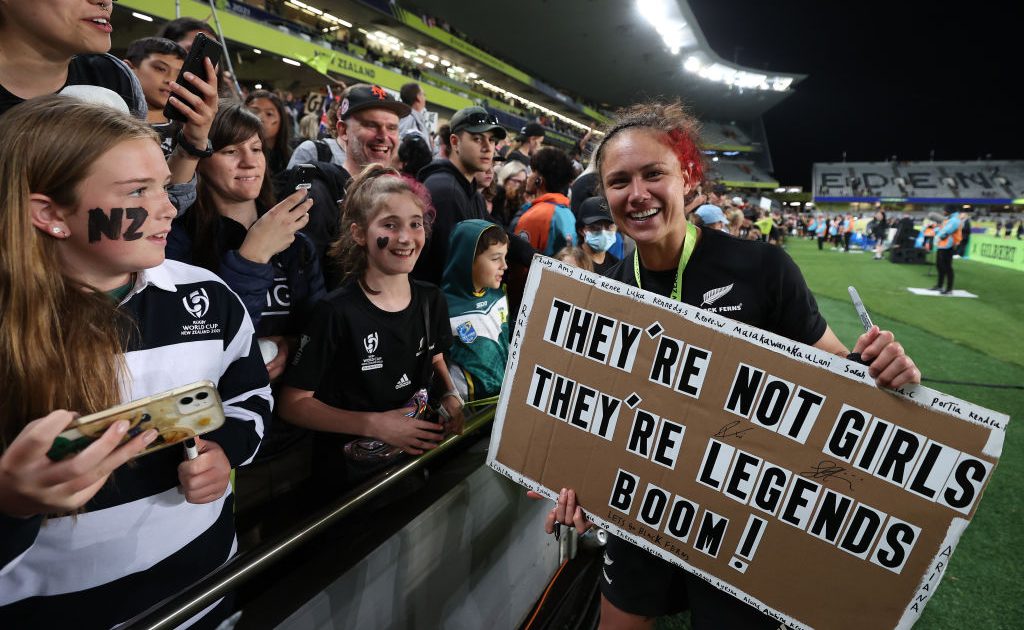Women's Game: 2022 Year in Review

If the headlines of 2022 belonged to the re-emergence of New Zealand as the world’s best, then the stories underneath it were all about the growing professionalism of women’s rugby and the plethora of new opportunities emerging for international teams and players.
From Fiji’s inclusion and eventual victory in Australia’s leading club competition the Super W, to first time professional contracts to players in Wales, Ireland, Scotland and Italy to name just four, and a thrilling World Cup, the women’s XV game has enjoyed 12 months like no other.
With more than 100 Test games played in one year for the first time ever, and major brands like TikTok getting involved in the Women’s Six Nations, the road to the next World Cup in 2025 in England, with hopefully none of the pandemic restrictions that blighted the journey to New Zealand, looks promising.
The start of the long awaited global WXV competition in 2023 will be the highlight of next year, while the rejigged sevens calendar will also draw high interest, given one of its benefits is parity between the men’s and women’s event, with all seven rounds featuring combined competitions for the first time.
New Zealand remain the story of the past 12 months though and their journey from disarray this time last year, to glory on home soil a few weeks ago is surely one that will spawn at least one book in the future.
I wrote a few months ago that it would be better for New Zealand if they didn’t win the World Cup, given the scant support they have so often received from their own union when they had won other titles.
What no one could quite have bargained for was the wild support that the Black Ferns generated from their own fans, so often reticent about turning out to support the women’s game.
That record and passionate home support and the brilliant reception the players are receiving all over the country on their champions tour, are certainly enough to suggest that it will be difficult for New Zealand Rugby to do anything but continue to support their fantastic team.
CHAMPagne Showers🍾#RWC2021 | #LikeABlackFern pic.twitter.com/g7GrSaFfQJ
— Black Ferns (@BlackFerns) November 15, 2022
And with the All Blacks off their best form, the potential of the Black Ferns is arguably now an opportunity that New Zealand Rugby cannot afford to mess up.
It is hard to get away from the fact that it took a player speaking out about mistreatment for things to change for the better in New Zealand, but that change, the World Cup win and the ongoing investment in the wider game there, has surely now cemented a rosy and sustainable future.
Key now is that the right head coach is recruited to replace Wayne Smith as New Zealand look to build as professional players to 2025.
Outside of one country though, it is perhaps England and decisions taken by the RFU which has arguably ignited the most change in the game this year.
It is hard to believe that England’s regular thrashing of the countries around them, as true this year as ever, did not have an impact on decisions by those unions to start to invest properly in their top women’s players.
Ireland have probably been the best beneficiaries, with their union saying just a year ago that contracts were not yet a priority, only for that decision to be reversed in the wake of a humbling 69-0 defeat in Leicester.
Record crowds have also helped to generate momentum in the game in the UK, with signs that the England v France game in Twickenham next April will break the record just set at Eden Park for the largest number of fans watching a women’s Test match live.
The RFU’s stated aims to professionalise the Allianz Premier 15s league has also accelerated discussions in the Celtic Nations for a new cross-border club competition, an effort perhaps at eventually stopping the best players from Ireland, Scotland and Wales choosing to play their club rugby on English shores in the Premier 15s.
It remains remarkable to me that not a single player in the Welsh World Cup squad plays their club rugby in Wales, and that can surely not be sustainable forever.
In the next Six Nations, for the first time ever, all of the teams involved will include contracted players – most of them fulltime – remarkable progress given that it is just under four years since England first took the plunge.
Away from XVs, and Australia enjoyed another stunning year in the sevens game– ending it as World Series, World Cup and Commonwealth Games Champions.
Since crashing out at the Olympics last year, Australia have hardly put a foot wrong in 2022, with a trio of titles coming within a few months.
Spearheaded by the vastly experienced Sharni Williams and Charlotte Caslick, players like Maddison Levi and Faith Nathan were outstanding in their various charge for gold.
Elsewhere Poland’s European Sevens Championship win is well worth mentioning as they became just the sixth nation to win that title since it was launched in 2003.
A new era awaits the women’s game in 2023, with a new global XV competition, more professional teams than ever before and a revamped sevens game.
There are challenges ahead but the game’s trajectory is on the up.






















